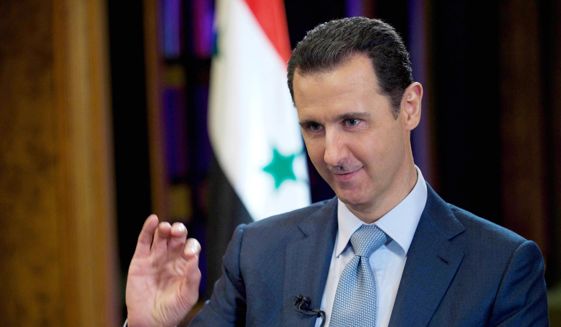
The Pentagon virtually announced on Friday that the US is pulling out of the civil war in Syria – recruiting and training rebel groups to overthrow the government of President Bashar al-Assad – and will instead concentrate its energy and resources on the fight against the Islamic State. The Pentagon announcement, here, followed a decision taken by President Barack Obama himself.
There is no sign that Obama spoke to his counterparts in Turkey, Israel or the Arab states – Saudi Arabia, UAE and Jordan, in particular – before taking this major decision. If so, it signals a new thinking that prioritizes the US’ core interests and vital concerns. The US has been involved during the past 2-3 years in a joint venture with its regional allies to train the Syrian rebel forces.
Obama’s decision to cut free, so to speak, comes better late than never. It is based on a realistic assessment of the limits to the US’ capacity to influence events in Syria. The US will not identify with the Russian intervention in Syria. But, significantly, the US is shifting its sphere of activity to northeastern Syria bordering Iraq.
Obama inherited the decade-old US policy to force a ‘regime change’ in Syria and did not invent it himself. The previous administration of George W Bush, imbued with the neocon ideology, had a one-point agenda to weaken and eventually destroy Iran by first installing a regime hostile to it in Damascus, thereby isolating it and denying it ‘strategic depth’ before frontally attacking it and overthrowing the Islamic regime. However, with the Iran nuclear deal, the ‘co-relation of forces’ in Middle Eastern politics has dramatically shifted and the neocons seem to belong to the Ice Age. The US is now poised to deepen its engagement with Iran.
But, ultimately, the audacious Russian intervention in Syria proved to be the clincher. Obama will not risk the US identifying with the Russian military moves in Syria and remains skeptical about the wisdom of Moscow’s decision, but he will not block the path of the Russians or undercut them, either. That is the real import of the Pentagon announcement yesterday. Put differently, Obama is giving the long rope to Russia and taking his Russian counterpart Vladimir Putin on his word – namely, that the logical progression of the Russian intervention will be on a trajectory leading to a genuine Syrian transition.
But then, Obama also sees the winds of change sweeping over the European thinking, as reflected in the stunning statement by the European Commission president Jean-Claude Juncker in Berlin on Thursday when he said,
- We must make efforts towards a practical relationship with Russia. It is not sexy but that must be the case, we [West] can’t go on like this… Russia must be treated decently. We [Europe] can’t let our relationship with Russia be dictated by Washington.
Indeed, the Syrian arena is heavily crowded and, therefore, the big question still remains: What will the US’ regional allies do now in the downstream of Washington’s decision to disengage from the agenda of overthrowing the Assad regime through force? To my mind, it is unlikely the US’ regional allies are in a position to form a collective under the emergent circumstances, given their disparate interests in the game and the contradictions in their mutual relations. This is one thing.
These countries – Turkey, Israel, Jordan and GCC states – will not have the gumption to confront Russia on their own. Make no mistake, Putin didn’t impulsively fire the cruise missiles at Syria from a distance of 1500 kilometers in the Caspian. It was a spectacular display of power across the Greater Middle East that conveys a big political message to the prima donnas active in Syria. Having said that, Russia is a great practitioner of diplomacy and will now move fast to ‘engage’ the US’ regional allies with a view to explain to them Moscow’s motivations, to address their genuine concerns (if any), to pacify them and raise their ‘comfort level’, and, finally, if push comes to shove, to dissuade them from doing any thing rash in the heat of the moment.
In the Russian calculus, Israel and Turkey are on a different footing because they have been directly interfering in Syria (unlike the sheikhs), and some degree of coercive diplomacy is needed to make them realize what is good for them. But the Gulf states (and Jordan) are a different kettle of fish. They feel disoriented without the US holding their hand in Syria. Moscow also has been building bridges toward them in the recent years. Unsurprisingly, Russian diplomacy is on a proactive mode in the Gulf region. (National).
Thus, a military delegation traveled from Moscow to Israel last week. Moscow has offered to hold similar consultations with Turkey as well. Israel has become uncharacteristically quiet. Turkey too has piped down its rhetoric. The Deputy Prime Minister Numan Kurtulmus was quoted by the Turkish official news agency Anadolu as saying on Friday,
- Turkey should not lose relations with Russia for the sake of any political advantages in Syria. Turkey and Russia have been living in peace for years. The two countries have very strong political, economic and trade relations. But Turkey is a country that will defend its borders. That is why we expect that Russia retreats and stops violating our borders if it says it was done by mistake.
Of course, the clincher will be Saudi Arabia. On the one side, there is the Saudi obsession to ‘contain’ Iran and to severe the nexus between Tehran and Damascus, while on the other side, Riyadh cannot sustain much longer financially and politically the ‘imperial overstretch’. It is difficult to guage how far Obama senses that the archaic Saudi regime is overreaching. (See an excellent analysis, here, in the Foreign Policy).
Indian Punchline – October 10, 2015
Source: http://blogs.rediff.com/mkbhadrakumar/2015/10/10/obama-cuts-loose-syrias-civil-war/

 October 29, 2015
October 29, 2015  Опубликовано в
Опубликовано в